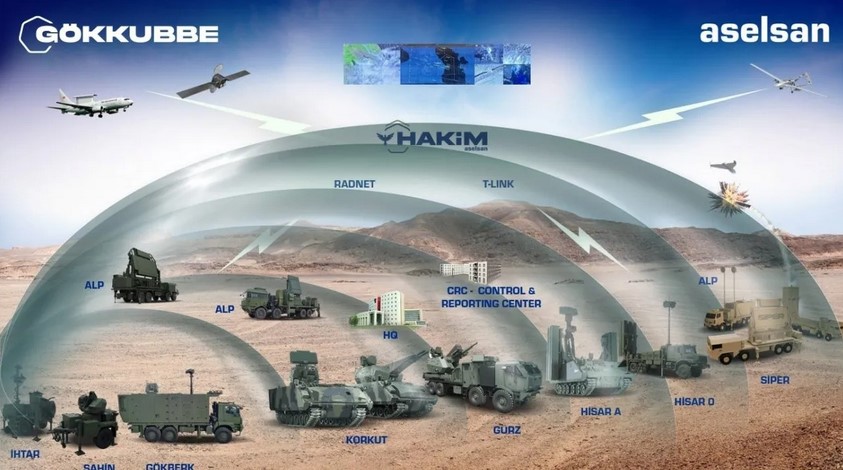

‘Steel Dome’ will be Türkiye’s first comprehensive air defense system. It is still uncertain whether the S-400s will be included in this system.
One of the most important decisions made at the Defense Industry Executive Committee meeting held on August 6, chaired by President Tayyip Erdoğan, was Türkiye’s move to establish a comprehensive air defense system called “Steel Dome” for the first time.
According to the statement made by the Directorate of Communications, Steel Dome is described as a “domestic and national” project that will enable “layered air defense systems and all sensors and weapons to work in an integrated manner under a network structure, creating a common air picture, delivering it to operation centers in real-time, and presenting it to decision-makers with artificial intelligence support.”
If we translate these technical definitions, a system is being designed that will simultaneously operate all warning systems including aircraft, drones, and satellites, along with low and high-altitude defense missiles and fighter jets.
The systems that Türkiye has developed, especially in the last 10-15 years, thanks in part to our NATO allies who have imposed a somewhat covert arms embargo, and advancements in software, now allow for this step to be taken.
The question that comes to my mind is this: Are the S-400s included in the Steel Dome project or not?
It’s necessary to ask; after all, this advanced air defense missile that we bought from Russia for $2.5 billion, at the cost of being unpleasantly removed from the F-35 project, currently the most advanced fighter jet in the world, is in the Turkish Armed Forces inventory.
It’s problematic whether we use it or not.
Türkiye is a NATO member. If Steel Dome will be used integrated with the NATO system, or if it will be open to this, using the S-400s would be quite problematic. It’s more plausible that it would be open to joint use with NATO because one of Türkiye’s important theses at the NATO Summit in Washington on July 9-11 was strengthening the Alliance’s Southeastern flank; Türkiye committed to increasing defense spending above 2 percent of national income, as per NATO membership criteria, despite the economic crisis.
If they won’t be used in the Steel Dome system, which is Türkiye’s first comprehensive air defense project, what are we going to do with the S-400s?
Cavit Çağlar’s solution, as told to Cansu Çamlıbel in T24, is simple: “If I were in charge, I would sell them and be done with it,” he said. He added, “The buyer is ready, Russia would understand us.”
Çağlar currently has no official position. But even without an official role, he played an important part in resolving the crisis that began when Turkish jets shot down a Russian jet on the Syrian border. He’s still familiar with state affairs.
I asked Çağlar why he made such a suggestion.
He answered concisely:
“The world is going through a sensitive period. Although we have many problems with the US, we are in the same alliance. I believe that if the S-400 issue is resolved, other issues will also find a path to resolution.”
“We can talk to both the Russians and the Americans. We can negotiate. Everything can be resolved through dialogue.”
Çağlar speaks a bit mysteriously; I got the impression that there might be things he knows but isn’t saying.
On the other hand, President Erdoğan, who says Türkiye had to buy S-400s because the US and Europeans didn’t sell NATO-compatible systems, says we need these missiles.
He says so, but there’s no indication that there’s a place for S-400s in the Steel Dome project. We’ll learn if officials explain. It’s a strategic issue that concerns us all.
In Turkish politics, the threat of imprisonment has reached CHP leader Özgür Özel. Presidential decrees…
The Cyprus issue has remained stuck in conceptual traps for decades, unable to move beyond…
It is understood that the meeting on June 29 between MİT President İbrahim Kalın and…
After five years, President Recep Tayyip Erdoğan had the opportunity to meet face-to-face again with…
Iranian women have been standing tall for years, not just against the regime, but also…
The U.S. Struck Iran at Israel’s Request. The U.S. launched B-2 heavy bombers from Whiteman…